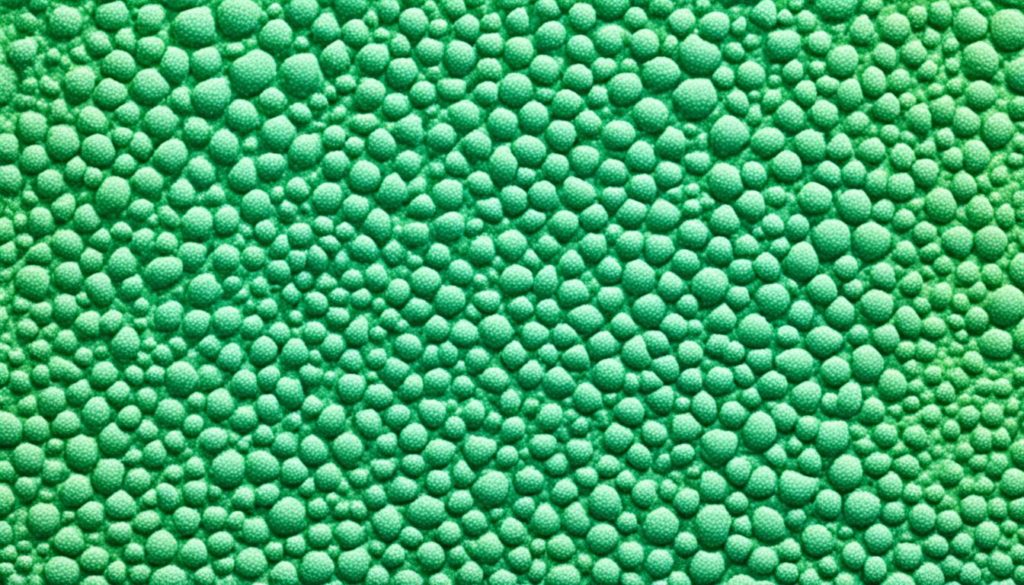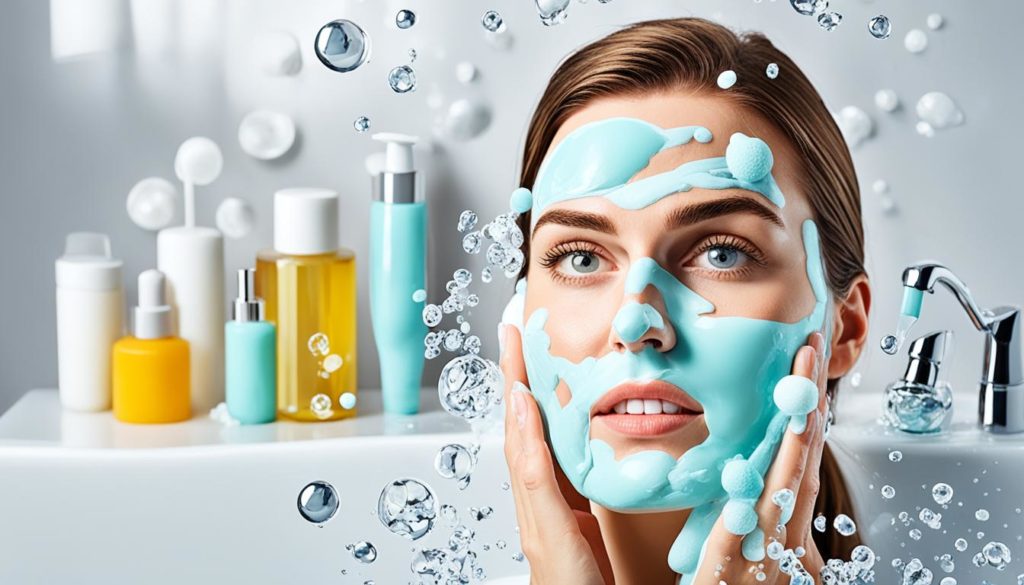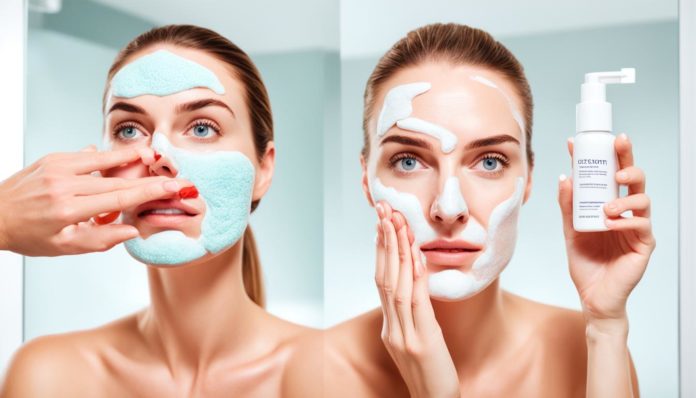Did you know nearly 50 million Americans deal with acne each year? Many people make skincare mistakes that make acne worse, not better. Knowing and avoiding these errors is key to good skin health. This article will highlight common acne treatment mishaps and help you get better skin.
Key Takeaways
- Understanding acne’s root causes is imperative for effective treatment.
- Over-washing and using harsh products can damage your skin.
- Avoiding moisturization is a significant acne treatment mistake.
- Consistency in your skincare routine is essential for success.
- Popping pimples can cause more harm than good; safe alternatives are available.
- Protecting your skin from the sun is vital in managing acne.
- Diet plays a crucial role in skin health; balanced nutrition helps prevent acne.
Understanding Acne: The Basics
Acne is a common issue that affects many people worldwide. To tackle it well, we must understand the basic acne causes and different acne types.
What Causes Acne?
The American Academy of Dermatology Association tells us acne comes from several factors. These include too much oil, dead skin, and plugged pores. Hormones, diet, stress, and genetics also play a role in acne. Knowing these acne causes helps us find the right best practices for treating acne.

Types of Acne
The National Institute of Arthritis and Musculoskeletal and Skin Diseases breaks acne down into various types. These include:
- Blackheads
- Whiteheads
- Papules
- Pustules
- Nodules
- Cysts
It’s important to know the different acne types for the right treatment. Each kind needs a specific method for better skin.
| Acne Types | Description |
|---|---|
| Blackheads | Open clogged pores, exposed to air, causing dark appearance |
| Whiteheads | Closed clogged pores, covered by skin, retaining a white appearance |
| Papules | Small, red, tender bumps without visible pus |
| Pustules | Red, tender bumps with visible pus at the center |
| Nodules | Large, painful, solid lumps beneath the skin surface |
| Cysts | Severe, painful pus-filled lumps, deep within the skin |
Over-washing Your Face
Dermatologists say trying too hard to fight acne can lead to over-washing your face. This might seem good but can upset your skin’s natural oil and pH levels. It can cause irritation and make acne worse. Avoiding these skincare mistakes is essential for healthy skin.

Washing too much removes vital oils important for skin health. This error can leave your skin open to infections and more acne. It’s key to dodge these errors for a balanced and strong skin.
Using Harsh Products
It’s important not to use harsh products on your skin. These can make acne worse and lead to more problems.
Chemicals to Avoid
Studies show that ingredients like alcohol, sodium lauryl sulfate (SLS), and synthetic fragrances can irritate your skin and make acne worse. Choosing products without these harmful chemicals is crucial. Instead, gentle products can keep your skin healthy.
The Impact on Skin Barrier
Using strong products can weaken your skin’s protective barrier. This makes your skin more sensitive and less able to hold onto moisture. The National Center for Biotechnology Information says a strong skin barrier is key to preventing acne. Keeping your skin barrier healthy helps avoid big skincare mistakes and leads to clearer, healthier skin.
Neglecting Moisturization
Even oily and acne-prone skin needs hydration. Skipping moisturizer is a big mistake in acne care. It can make skin oilier.
This happens because skin makes more oil when it’s dry. This can lead to more breakouts.
Knowing what to do—and not do—for acne is key. Moisturizers keep your skin’s barrier healthy. This stops more irritation and acne.
Choose moisturizers that won’t clog pores. Look for ones labeled non-comedogenic.
Not moisturizing affects your skin and acne care in big ways. Let’s see how important it is:
| Impact of Neglecting Moisturization | Proper Moisturization Benefits |
|---|---|
| Increased Oil Production | Regulated Oil Secretion |
| Compromised Skin Barrier | Enhanced Skin Barrier Strength |
| More Breakouts | Reduced Breakouts |
| Dryness and Flakiness | Well-Hydrated Skin |
Adding these tips to your skincare helps a lot. Adequate moisture is key to treating acne effectively.
Acne Treatment Mistakes in Your Routine
Trying to get clear skin can lead to mistakes. Inconsistency and using too many products can set you back. Stick to a routine and resist adding too many items.
Inconsistent Application
Using skincare products inconsistently is a big mistake. For results, use acne treatments regularly. Missing days or not following directions can harm your progress. So, regular application is key for balance and effectiveness.
Combining Too Many Products
Using too many products at once is another error. This can irritate your skin and make acne worse. Active ingredients in different products may not work well together. Start with a few trusted products and slowly add new ones, watching how your skin responds.
Popping and Picking at Pimples
Popping and picking at pimples is a common mistake in acne treatment. It often seems tempting but can lead to more skin problems. This habit can actually make avoiding acne treatment pitfalls harder.
Risks of Pimple Popping
When you pop pimples, bacteria can go deeper into the skin. This can cause more inflammation and infection. The American Academy of Dermatology says this can make acne worse and leave scars.
Safe Alternatives
There are safer ways to deal with pimples than picking at them. Hydrocolloid patches are a good option. They soak up excess fluid and keep bacteria away.
Seeing a dermatologist for professional extraction is also smart. It reduces risks of scarring and infection.
Let’s consider the outcomes of popping pimples versus safer choices:
| Approach | Potential Risks | Benefits |
|---|---|---|
| Pimple Popping | Infection, Severe Acne, Scarring | None |
| Hydrocolloid Patches | Minimal (if used correctly) | Absorbs Fluid, Protects Skin |
| Professional Extraction | Minimal (if done by a professional) | Reduces Infection, Minimizes Scarring |
Skipping Sunscreen
People with acne-prone skin often skip sunscreen, thinking it will clog their pores. This is a big mistake.
UV rays can make acne scars worse and increase skin cancer risk. Choose non-comedogenic and oil-free sunscreens to avoid these issues. These products keep your skin clear and protected.
Let’s look at the differences between traditional and acne-friendly sunscreens:
| Traditional Sunscreen | Non-comedogenic Sunscreen |
|---|---|
| Contains heavy oils | Oil-free |
| May clog pores | Designed to prevent pore clogging |
| Potential for breakouts | Minimized breakout risk |
| Thick and greasy | Lightweight formula |
Choosing the right sunscreen can stop acne treatment mistakes. It also protects against UV harm.
Diet-Related Skincare Errors
It’s important to know how your diet affects your skin, especially with acne. Certain foods can trigger acne. Yet, a good diet with needed nutrients helps your skin look better.
Foods That Trigger Acne
Research shows that some foods make acne worse. Dairy and sugary, high-glycemic foods are big triggers. They cause inflammation and more sebum, leading to breakouts. Watching what you eat is key to fighting acne.
Benefits of a Balanced Diet
Eating right is crucial for acne management. Whole grains, lean proteins, and lots of fruits and veggies are good for your skin. These provide nutrients and antioxidants that fight inflammation and may lower acne issues.
| Food Type | Impact on Skin |
|---|---|
| Dairy Products | Can trigger acne by increasing sebum production |
| High-Glycemic Foods | May cause blood sugar spikes, leading to more breakouts |
| Whole Grains | Provide essential nutrients that support skin health |
| Lean Proteins | Help repair skin tissues and reduce inflammation |
| Fruits and Vegetables | Packed with antioxidants and vitamins for healthier skin |
Making smart food choices is vital for clear skin. Avoiding acne triggers and choosing balanced meals can improve your skin health greatly.
Ignoring Professional Advice
Avoiding a big mistake in treating acne means not ignoring skincare experts’ advice. Many people try to fix acne with store-bought products or online tips without asking a skincare pro.
Seeing a professional helps tailor your acne solution. A dermatologist picks the right treatment for your skin type. This makes the treatment work better. Without their advice, you might use the wrong products. This can make your acne worse.
acne treatment mistakes, but it also updates you on the best skincare methods. So, consulting a professional is key to getting clear and healthy skin.
Using Expired Products
One major skincare misstep to steer clear of is using expired products. These items can become homes for bacteria and lose their power. This may lead to skin issues or infections. It’s vital to keep an eye on the expiration dates of your skincare products.
Sticking to expiration dates helps avoid serious expired skincare risks:
- Reduced Efficacy: Old products might not work as well, failing to address skin problems.
- Potential Irritation: Over time, ingredients in these products can turn harmful and irritate the skin.
- Bacterial Infection: The older the product, the higher the chance of bacteria, possibly leading to infections.
To steer clear of these issues, follow these steps in your skincare routine:
- Always check expiration dates before buying and using skincare products.
- Store products correctly to keep them working well and lasting longer.
- Throw away any product that is past its expiration date, no exceptions.
Here’s a quick guide on the shelf life of common skincare items:
| Product Type | Typical Shelf Life |
|---|---|
| Moisturizer | 1-2 years |
| Cleanser | 2 years |
| Sunscreen | 1-2 years |
| Serum | 1 year |
| Eye Cream | 6-12 months |
By carefully following these recommendations, you can lessen the risk of expired skincare risks. This way, you keep your skincare routine safe and effective.
Conclusion
Managing acne well means understanding and avoiding common mistakes. We’ve gone over key areas where errors often happen. These include over-washing the face and not wearing sunscreen. Knowing these mistakes helps follow the right treatment for your skin.
Using strong products or not using moisturizer can hurt your skin. It’s also crucial to apply products consistently and not mix many at once. Additionally, not popping pimples and improving your diet can help your skin become healthier.
Ignoiring advice from pros or using old products can make acne worse. Following the right acne care tips can give you control over your skin care. By keeping these tips in mind and understanding your skin’s needs, you’ll be on your way to better skin health. Check out this article for more tips, especially for adult women looking to manage acne.
FAQ
What are the most common acne treatment mistakes to avoid?
Common mistakes include washing your face too much and using rough skincare products. Skipping on moisturizer and not being consistent with treatments are also errors to avoid.
What causes acne?
Acne happens due to many reasons like too much oil, blocked pores, and dead skin. Hormones, diet, stress, and genes also play a role in causing acne.
Are there different types of acne?
Yes, acne comes in different forms such as blackheads, whiteheads, and more serious types like nodules. Each type varies in appearance and may need different treatments.
Can over-washing my face lead to more acne?
Washing too much can remove natural oils, leading to irritation and worse acne. Cleanse gently, not more than two times a day.
Which chemicals should I avoid in acne treatments?
Stay away from harsh chemicals like alcohol and SLS. Also, avoid synthetic fragrances. Choose gentle products that won’t clog pores.
Why is it important to keep my skin moisturized?
Even skin with acne needs moisture. Moisturizing helps maintain the skin barrier, regulates oil, and prevents new breakouts.
What are the risks of pimple popping?
Popping pimples can make acne worse by pushing bacteria deeper. It can also lead to scars. Use hydrocolloid patches instead or see a specialist.
Should I use sunscreen if I have acne-prone skin?
Definitely use sunscreen to protect from UV damage, which can make scars worse. Choose sunscreens that are oil-free and won’t block your pores.
Can diet impact my acne?
Some foods, like dairy and those high in sugar, may trigger acne. Eat balanced meals with lots of fruits, veggies, and lean proteins for healthier skin.
Why should I seek professional advice for acne treatment?
Dermatologists tailor treatment plans for your skin’s unique needs. DIY approaches without their guidance might not work well.
Is using expired skincare products harmful?
Yes, using expired products can harm your skin. They become less effective and can grow bacteria, leading to irritation or infections. Always check the expiry date.


